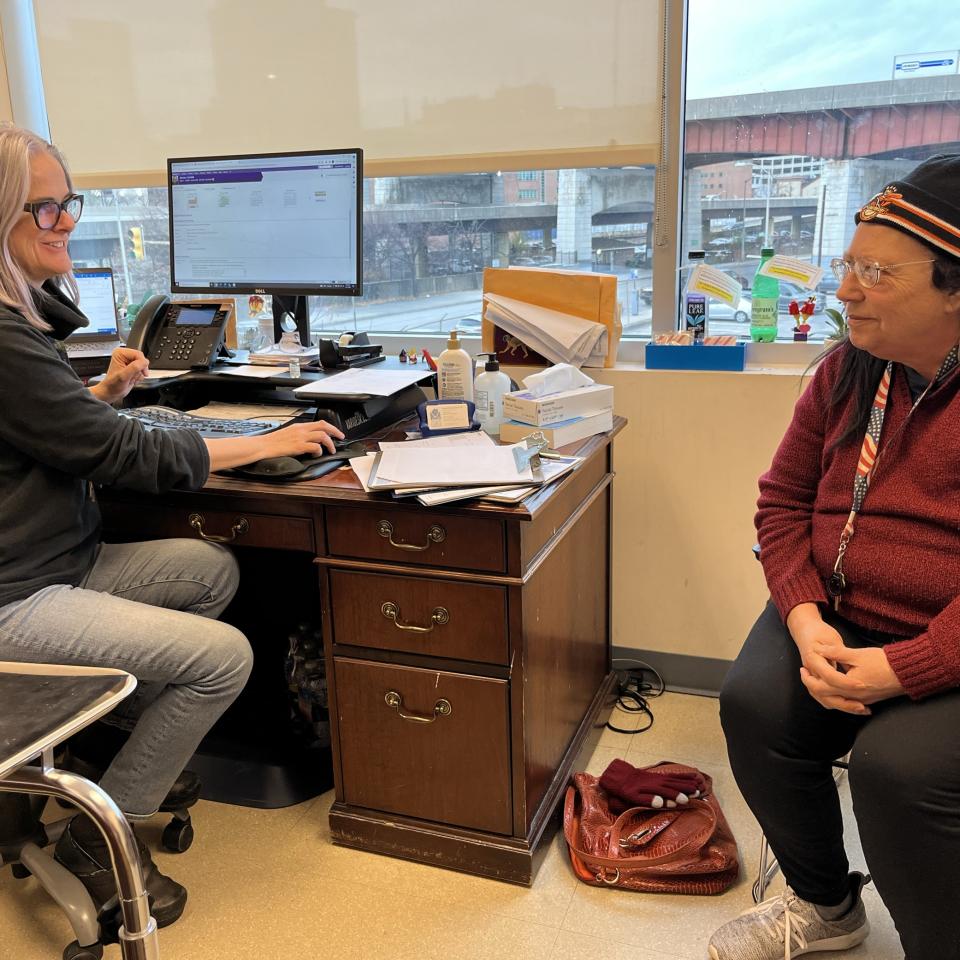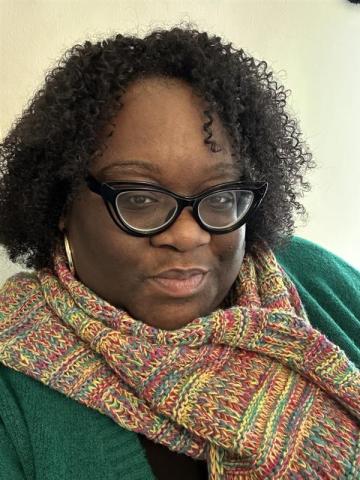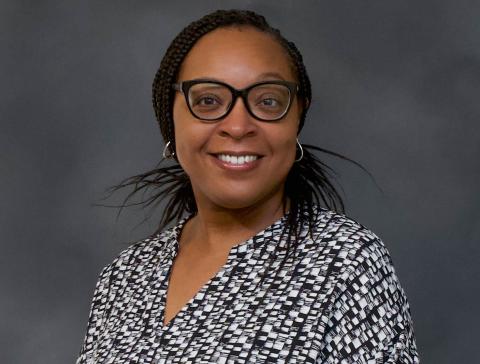
Earning back trust in psychiatric care
Photo: Marian (right) checks in with psychiatrist Dr. Meredith Johnston every month.
"I come and get my shot here every month,” Marian says. “I don’t miss any days.”
She’s here at our downtown clinic for a check-in with Dr. Meredith Johnston, director of psychiatry, who she's been seeing for five years. And while it might sound like a simple statement, Marian would be the first to tell you that getting to this place of regular care took a long time.
Like many people who have had to navigate the mental health care system, she's had painful experiences when seeking care.
“In 1990, I was in the hospital for a month with pneumonia and I was diagnosed with HIV,” Marian remembers. “My doctor took me to mental health court in Delaware. The judge forced me to comply with treatment. I wasn’t allowed to leave the state for a year.”
Rebuilding trust after negative experiences with mental health care can be daunting. “A lot of the people we see have had traumatic experiences with medication,” Meredith explains. “You might have had your first brush with mental health care by way of the police or ending up in handcuffs at the ER.
“As a physician, I have to name and acknowledge that experience,” she says. To help build back a sense of control and trust, Meredith and other psychiatrists on the Behavioral Health team at Health Care for the Homeless emphasize autonomy and shared decision-making.
Finding the right kind of treatment can be a long journey for anyone, but trusting clients’ expertise in what works best for their health is an important first step.
“I will not take the pills; I don’t like how they make me feel,” Marian says. And she pays attention to which medications give her more energy. “Dr. Johnston is good. She knows all this stuff.”
With time, Marian and Meredith found a regimen that works—a long-acting injectable antipsychotic, or LAI. LAIs work well for a lot of clients that Meredith sees, who might find it difficult to hold onto and take a medication every day. Marian says, “You have to stay on time every month and it will work. But it’s a little bit of progress at a time, and other people will notice it before you do.”
“For a lot of people, it’s been a hard road with medication,” Meredith says, “but sometimes you just find life is better on it than off it. If a shot can help you stay out of the hospital, stay housed, be more stable—that can be amazing.”
Being able to get a range of care under one roof also helps. Marian has both a psychiatrist and a therapist—and she can also get her HIV treatment, her primary care and occupational therapy all here. Meredith says, “We can really individualize it for what the client needs and that establishes a lot of trust.”
Marian is taking marketing and computer classes through B’More Clubhouse, a local nonprofit. “I’m trying to keep stability. I have an occupational therapist here, he’s helped me set up a routine—that’s just basic life skills: wash my face, brush my hair, change clothes, and then I have these classes that I’m incorporating—I’m picking up math and computer skills. It’s hard, it’s stressful. But I want to fight the battle. I want to go back to school and try one more time.
“I don’t know if I’m managing my mental health—I’d have to get a manager involved for that,” Marian jokes. “Just dealing with it and coping with it how I can, that’s enough.”
More Recent News
We are thrilled to welcome Nikia Woodard, our new Director of Human Resources! With more than two decades of experience in the HR field, Nikia previously held leadership roles with the Maryland Transit Administration, Unified Women’s Healthcare and a behavioral health residential treatment facility for youth in Baltimore. Most recently, she served as Director of Employee Experience & Organizational Development at Loyola University Maryland, implementing university-wide professional development programs and encouraging a culture of continuous learning. Read on to learn more about Nikia (and her favorite snack)…
After a year of serving as Practice Manager of West Baltimore, Alkema Jackson is moving into the new role of Director of Practice Operations, Community Sites! She joined Health Care for the Homeless in 2022 as the Client Access Project Coordinator, collaborating across departments to help more people connect to agency services, and in 2023, she received a Core Value Award for Hope. Read on to learn more about Alkema’s approach to this new position…
Meet Christana Greene, our new Director of Compliance! With more than five years in the compliance field—most recently as Senior Quality and Patient Safety Specialist at GBMC Healthcare—Chrissy brings frontline insight to the role. She began her career as a medical assistant, gaining firsthand experience in what it takes to keep care safe and operations running smoothly. In her new role, Chrissy is focused on building a compliance culture grounded in safety, integrity and accountability. Read on to learn more about Chrissy...
Baltimore gets dangerously cold, and too many of our neighbors are out there. Here are three simple things you can do to make a difference in someone’s life this winter.




